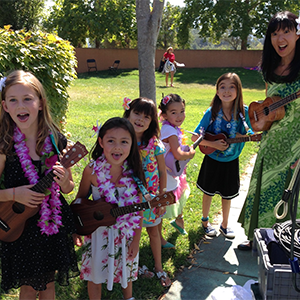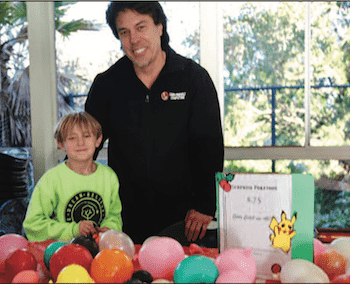Raise a Musical Child...Even if You Aren’t a Musician
By Suki Wessling

I think that it’s a wonderful thing to have your children go and be in a room filled with music, see other kids listening to music and dancing and moving your body.
 “They felt like they were going to give us something that we would use for the rest of our lives,” music educator Barbie Wong says of her parents.
“They felt like they were going to give us something that we would use for the rest of our lives,” music educator Barbie Wong says of her parents.
Wong is a music educator who has made a study of how parents can instill a love of and passion for music in their children’s lives. She leads workshops for parents on the subject, starting with biology.
“When I teach my workshops to parents and teachers I have them focus on these four words: kids love to copy,” Wong explains. “That’s actually biologically sound—it helps them bond when they’re babies, that’s also how they learn their mother tongue.”
Barbie Wong’s parents didn’t have a lot of money, but they always found a way to pay for music lessons. Wong says that they were relying on cultural knowledge from their native Taiwan that music was an important part of child development.
But science has also weighed in, and with few exceptions, found nothing but good news in the ways music affects the growing brain. They can see actual growth in the brains of children who study music, seeing improved memory during a year of instruction. There is a correlation between music study and academic achievement as well, especially in math. Studying music shows brain fiber connectivity improvements in children with ADHD.
Even children who don’t do formal music study can benefit from a musical environment. Studies show that music can help emotional stability, improve behavior, and even improve the auditory skills of children with hearing impairments.
Kids love to copy
“My dad was a self-taught musician and did some performing in the country music genre,” remembers music educator Holly Ota. “His dad had been a honkytonk musician, playing banjo in clubs. I was encouraged to take piano lessons and sing in Choir at church.”
Ota, who leads the choral programs at Aptos Junior and Aptos High, seconds the
idea that a musical environment is key.
“The essence is: how do you get them to internalize and love music, regardless of what the product is?” Ota says. “That comes with all that exposure, and that you honor art.”
Ota recommends that there is no better place to start, especially if you don’t feel particularly musical yourself, than classes for preschoolers and their parents. She raves about Music Together, run locally for the last 25 years by Lizz Hodgin Weihrauch.
“She is amazing with young kids,” Ota says. “She had the sense of the value of bringing music to the community and the families and building those relationships with the families so that would be part of the fabric of her life.”
In Music Together classes, copying is key. Parents are instructed not to ‘teach’ their children, but rather to be eager participants themselves. The children can’t help but join in.
“I think that it’s a wonderful thing to have your children go and be in a room filled with music, see other kids listening to music and dancing and moving your body,” Barbie Wong says. “Any kind of music you can bring to your kids is positive.”
Musical adults grow from musical households
Wong has made a study of the biographies of musicians of all types, from Dolly Parton to Yo-Yo Ma. She wanted to find out whether these passionate practitioners of music had commonalities in their childhoods.
“Biographies all talk about how much music was in the environment when they were young,” Wong noticed. “Lin-Manuel Miranda’s parents saturated his environment with music and it’s not surprising that they listened to musicals!”
It’s true that most of our children aren’t going to grow up to write musicals or be a country star. In fact, Wong says that her own parents were shocked when she changed her major from pre-med to music. It wasn’t really the career they had envisioned, but rather, the gift of being able to make music and appreciate music.
“If we as parents make a lot of music, put a lot of music in the environment, the kids will naturally pick it up as they have their first language,” Wong states. “I don’t believe that musical ability is innate, or that certain people are more gifted than others to make music. I believe that everybody is capable of making music.”
Music comes from community
“When you look at the careers of professional musicians, especially singers, so much of it started with the church,” Holly Ota points out.
Places of worship offer a natural community of musicians, whether it’s just singing from the pews or in the choir. Families who don’t belong to a church community can look around at what’s offered in their community.
“If you live near any kind of college or university, the music department will often have student performances for free,” suggests Barbie Wong. “If you have kids whose friends are taking music, they often have recitals—go and sit in on those recitals.”
In Santa Cruz, of course, as we return to normality we will hopefully see the music return, whether it’s a guy on a street corner busking for dollars or professional musicians playing at Abbott Square or in cafes and restaurants. Parents can seek out these experiences to reinforce the idea that music is a regular and important part of our environment.
Holly Ota says that Santa Cruz’s music environment is improving in another way as we finally come back from years of educational budget-cutting.
“We do all have a community where hopefully music is made—and it’s school,” she points out. “So I would definitely campaign for more schools making certain that all of their students get a free music education. We’re moving in the right direction. Aptos has complete offerings of choir and band at both schools now.”
The further benefits of musical training
Both Holly and Barbie were their children’s first music teachers, training them on piano from a young age.
“At some point I started teaching [my first child] some songs and she seemed tmo get it,” Barbie remembers. “But unfortunately, I didn’t really have the skills to teach a young child—I was trying to get my child to focus on too many things at once and I was being too critical.”
She started to do some research and realized that what makes a good teacher for young children is not necessarily the person to groom them for high-level performance.
“A study by Benjamin Bloom looked at professionals in a bunch of areas, when he looked at these first coaches or teachers, what they had in common was not that they were the best in their field. What they did have in common was they all were kind and warm and cared about children.”
Barbie suggests that parents look for a first teacher who is warm and fun and takes their time to bond with the child. Music lessons for young children, she points out, should be fun and may not emphasize that much time in front of the instrument.
There’s no time to lose
At this point, our children need the therapy that music offers, whether formal or informal. They need music in their homes, music in their community, and music in their educational environments. They need, Holly Ota says, a reason to get out of bed in the morning.
“I hope they’re taking a stronger sense of self and self-value, self-confidence, self-worth,” Holly says of her students. “Every facet of our society benefits when a person feels more whole, more important, more capable…more inspired!”
For more information:
- Read more about Barbie Wong at BarbieWong.com
- Read more about Music Together at MusicalMe.com
- Read the research at sciencedaily.com/search/?keyword=music+children
- Listen to a podcast of interviews with Barbie and Holly: ksqd.org/how-can-we-encourage-musicality-in-children/
Suki Wessling is a local writer, educator, and musician. Learn more at SukiWessling.com.







